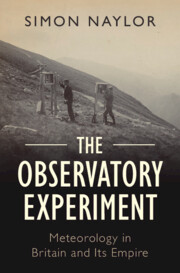Book contents
- The Observatory Experiment
- Science in History
- The Observatory Experiment
- Copyright page
- Contents
- Figures
- Acknowledgements
- Introduction: Observatory Experiments
- 1 Meteorology All at Sea
- 2 Meteorology at the Colonial Observatories
- 3 Mountain Meteorology on Ben Nevis
- 4 Geographies of the Rain
- Conclusion: Historical Geographies of Future Weather
- Bibliography
- Index
1 - Meteorology All at Sea
Published online by Cambridge University Press: 05 October 2024
- The Observatory Experiment
- Science in History
- The Observatory Experiment
- Copyright page
- Contents
- Figures
- Acknowledgements
- Introduction: Observatory Experiments
- 1 Meteorology All at Sea
- 2 Meteorology at the Colonial Observatories
- 3 Mountain Meteorology on Ben Nevis
- 4 Geographies of the Rain
- Conclusion: Historical Geographies of Future Weather
- Bibliography
- Index
Summary
Chapter 1 considers relations between science and the maritime world by examining the British Admiralty’s participation in meteorological projects in the nineteenth century, focusing on the period between the conclusion of the Napoleonic Wars and the Conference on Maritime Meteorology in 1874. It examines the roles played by individuals and institutions, guidebooks and regulations, in promoting a culture of instrumental meteorology onboard voyages of exploration, and on Royal Naval and Hydrographic Office survey ships. The work of Admiralty Hydrographer Francis Beaufort and Army engineer William Reid are discussed. Particular attention is paid to attempts to establish national and international standards for the study of meteorology at sea. The chapter discusses the consent given by the British Admiralty to allow its ships to be turned into floating meteorological observatories.
Keywords
- Type
- Chapter
- Information
- The Observatory ExperimentMeteorology in Britain and Its Empire, pp. 22 - 65Publisher: Cambridge University PressPrint publication year: 2024

